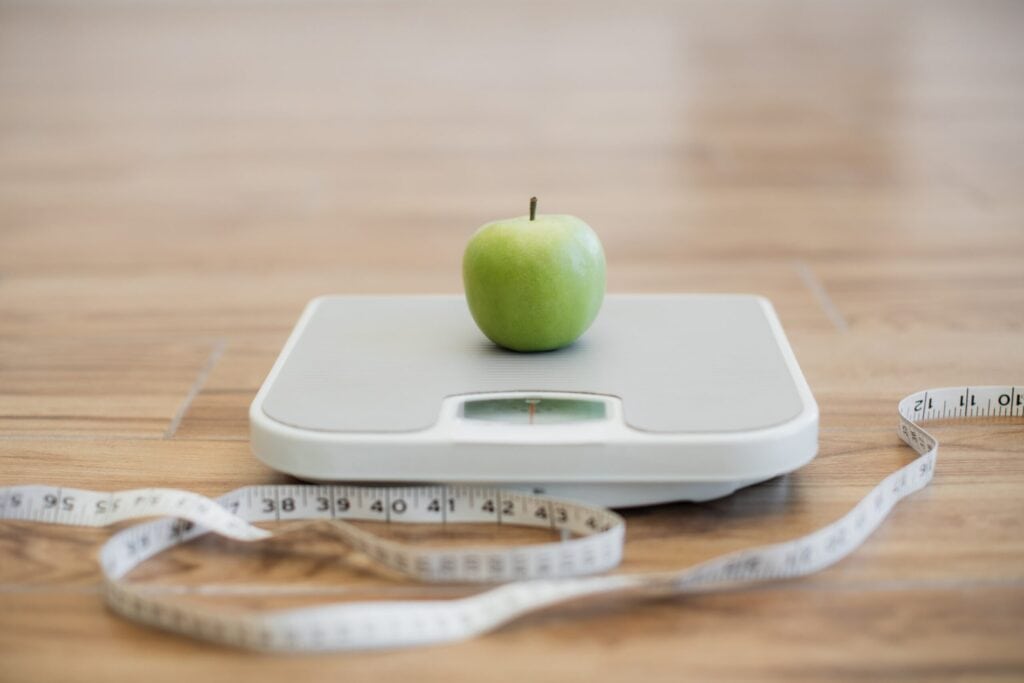Are you looking to lose weight and lead a healthier life? Have you tried cutting high calorie drinks and following a nutritious diet but still struggle to shed body fat? Does it feel like achieving your ideal body composition is simply just a figment of your imagination? If you answered yes to any of these questions, you’re not alone. Many of our patients share those same thoughts and want to learn how to lose weight fast to achieve a healthy weight.
At Custom Health Centers, we are experts in weight loss and weight loss maintenance. Our health care providers are knowledgeable about rapid weight loss strategies and know techniques that can help our patients safely achieve their body weight goals. Therefore, we will share numerous tips on losing weight fast in Michigan so you can finally say goodbye to your excess weight.
Why Are More People Seeking Rapid Weight Loss?

Today, overweight and obesity are considered an epidemic and have garnered attention as a public health crisis. But let’s consider some of the statistics, shall we?
In the 1960s, only 13% of U.S. adults were obese, and 31.5% were overweight. Fast forward to today, and data suggests that almost 40% of U.S. adults are obese, and 74% are considered overweight. The Centers for Disease Control and Prevention states that there were more than 100 million obese adults in the United States between 2017 and 2020.
Those statistics reveal that the prevalence of overweight and obesity has dramatically increased, which may explain why more and more people are interested in losing weight.
Common Reasons to Lose Weight

It’s assumed that many people seek rapid weight loss solely for cosmetic reasons, but this isn’t true. Other reasons might include:
Better overall health: Individuals may want to improve their overall health, as excess weight is associated with additional risk factors, like type 2 diabetes.
Improved outcomes: Most treatments and procedures are more effective when done at a healthy weight. For instance, pregnant women and babies may experience more complications if the mother is overweight.
Disease management: Losing weight may help individuals improve or reverse a health condition. For instance, poor sleep or sleep deprivation could be remedied with weight loss.
Psychological benefits: Weight loss can improve someone’s self-esteem and emotional health. Exercise is also viewed as a form of stress management for many.
Reach fitness goals: Increasing strength, improving flexibility, building lean muscle, and/or running a 5k are fitness goals that often align with losing weight.
Understanding Weight Gain

Before we can address how to achieve rapid weight loss, we must first clarify weight gain. There are many causes of obesity and overweight, but in general, they are caused when excess calories are stored in the body as fat. But how does this happen?
Typically, it comes from an imbalance of energy intake and energy expenditure. Energy is measured using calories. We use calories to measure the amount of energy foods have, which is why people want to know how many calories are included in a dish or snack. Those trying to lose weight try to consume fewer calories.
We also use calories to measure the amount of energy individuals use during physical activities. An energy imbalance occurs when people consume high fat and sugary foods and don’t burn all of those calories through physical activity. This excess energy translates to weight gain, like stubborn belly fat.
Calorie intake is necessary for one’s health, as we need calories to sustain life. However, consuming more calories than we need isn’t a way to lose weight. While it’s possible to have a high calorie diet and achieve weight loss, it requires discipline, a healthy eating plan, and exercise.
Fad Diets, Crash Diets, and Other Diets for Rapid Weight Loss

If losing weight were as simple as snapping a finger, nearly everyone would do it. However, it’s not always clear what living a healthy life looks like or what’s required to lose weight. As a result, many people look to fad diets and crash diets as a sound solution. They promote that you’ll lose weight fast, but that doesn’t necessarily mean you’ll lose weight safely.
While research shows that fad diets may help facilitate easy and fast weight loss, there is a concern for nutritional inadequacies. These diets often require that you eliminate one or more of the essential food groups. Therefore, while it may improve appearance, the rapid weight loss could have long-term consequences due to micronutrient deficiencies.
Paleo Diet: An Example of a Weight Loss Fad Diet

Let’s use the Paleolithic diet as an example. Those following this diet often avoid dairy, whole grains, and processed foods. Since the diet is low in carbohydrates, most individuals start off losing water weight. Over the course of 10 to 12 weeks, people may lose 4% to 6% of their body weight. However, while it does promote weight loss and can help you lose weight, it can also cause calcium deficiency. In fact, one study found that this diet provided about 50% less calcium than the daily requirement.
Calcium is involved in multiple body functions, including strengthening bones and teeth, managing heart function, and even enzyme function.
A Very Low Calorie Diet
This rapid weight loss program involves significantly restricting the number of calories you consume, with most involving people eating 800 calories or less daily. However, one major concern with this diet is that it reduces skeletal muscle mass. While it’s not considered a fat diet, this dietary regimen might not be the best choice for everyone.
Intermittent Fasting
Intermittent fasting is a dietary approach that alternates between periods of eating and fasting. Unlike traditional diets that focus on what you eat, intermittent fasting is more concerned with when you eat. It helps with weight loss by reducing calorie intake and increasing metabolism. Nonetheless, there are cons to this approach, like potentially overeating, negatively impacting blood sugar levels, and nutritional imbalance.
Low Glycemic Foods Diet
A low glycemic foods diet focuses on eating foods that have a low glycemic index, which is a measure of how quickly a food raises blood sugar levels. Foods with a low glycemic index are digested and absorbed more slowly, which can help manage blood sugar levels, reduce hunger, and support overall health.
Overall, it’s important to use caution when considering fad diets and believing their health claims. Although they may help you drop pounds, they aren’t considered the most realistic or healthy rapid weight loss approach.
What is a Healthy Rate of Weight Loss?

The National Heart, Lung, and Blood Institute recommends that people aim for 1 to 2 pounds per week for about 6 months. This is a more realistic and sustainable goal than trying to lose 20 pounds in a week or month. Losing weight too quickly may cause you to lose muscle and water weight and lead to nutrient deficiencies.
Setting Realistic Weight Loss Goals
It’s crucial to create goals if you want to lead a healthier life. Some experts suggest that individuals start by trying to lose 5% of their current weight. Research even supports that a 5% weight loss from baseline is considered a “clinically meaningful” amount, leading to improved blood pressure and HDL cholesterol.
How to Set Achievable Weight Loss Goals
One of the best ways to create goals is to set SMART goals. SMART is an acronym that stands for Specific, Measurable, Achievable, Relevant, and Time-Bound. Stating that you want to lose weight quickly doesn’t give you any real direction for achieving weight loss. A solid SMART goal can give you some clarity, though.
For example, a SMART goal for adjusting your eating habits and beverage and food intake might be, “I will pack my lunch four times this week instead of eating out” or “I want to drink 8 glasses of water a day and only drink sugar sweetened beverages once per week.” Those are statements you can measure.
If you reach your goals, you should reward yourself. SMART goals help you focus on taking care of your body first rather than just trying to lose weight. It breaks larger goals into smaller, safe goals, such as losing 1 to 2 pounds per week.
To help you get started, contact Custom Health Centers. Our team of medical professionals can help you create a personalized and safe rapid weight loss plan.
Nutrition Strategies to Lose Weight Naturally

One way to achieve safe, rapid weight loss is to incorporate healthy eating. Consider the details below.
Focus on Whole Food Groups
Eating whole foods is a fantastic way to support overall health and well-being. Whole foods are minimally processed and free from artificial ingredients. Aim to consume five daily servings of produce and work up to seven to nine servings a day. Include more protein-rich foods in your diet to help you lose weight safely and effectively.
Fruits and Vegetables: Aim for a variety of colorful fruits and vegetables. They provide essential vitamins, minerals, and fiber. Think leafy greens, berries, sweet potatoes, and bell peppers.
Whole Grains: Choose whole grains like quinoa, brown rice, oats, barley, and whole wheat. They offer more nutrients and fiber than refined grains.
Lean Proteins: Include sources like chicken, turkey, fish, beans, lentils, and tofu. These provide essential amino acids and can be more nutritious than heavily processed protein sources.
Nuts and Seeds: Almonds, chia seeds, flaxseeds, and walnuts are great sources of healthy fats, protein, and fiber.
Healthy Fats: For heart healthy fats, incorporate sources like avocados, olive oil, and fatty fish (e.g., salmon).
Have You Tried Mindful Eating?
Mindful eating and eating slowly could also help you lose weight. Most people don’t realize that they eat too fast. When you eat quickly, you’re more likely to consume more calories because it takes time for the brain to realize that you’ve eaten enough.
Reduce Sugar Intake
These days, snack foods are everywhere, and while they’re good, they don’t help people lose weight. Therefore, try to cut out or drastically curtail your intake of high glycemic foods. Limit or avoid foods with added sugars, refined carbohydrates, and high-calorie drinks.
Improving the quality of the foods you eat can help you shed weight quickly. In fact, there’s clinical evidence that a high protein diet promotes weight loss and decreases cardiovascular disease risk factors, like high blood pressure.
Lifestyle Changes for Sustainable Weight Loss
In addition to changing your eating habits or trying a low calorie diet, another way to lose weight is to increase movement.
Increase Physical Activity

Increase your non-exercise activity thermogenesis (NEAT) by doing small changes like carrying groceries or taking the stairs. Engage in regular physical activity, such as cardio or aerobic exercise, to improve overall health and support weight loss. Build more muscle through strength training to burn more calories and increase resting metabolic rate.
Get Enough Sleep
Get enough sleep (7-9 hours for adults) to help regulate hunger hormones and support weight loss. Poor sleep can lead to increased cravings for unhealthy foods and decreased motivation to exercise. Aim for a consistent sleep schedule and create a relaxing bedtime routine to improve sleep quality. How much sleep you get can impact your overall health.
Weight Loss Treatments

When some people think of weight loss treatments, they think of weight loss surgery. However, there are other ways to lose weight, like weight loss medications.
Semaglutide for Weight Loss
Semaglutide is a medication originally developed to treat type 2 diabetes, but it has gained attention for its effectiveness in promoting weight loss. It’s a GLP-1 (glucagon-like peptide-1) receptor agonist that mimics the action of the GLP-1 hormone. This incretin hormone is known to help regulate blood sugar levels, appetite, and digestion.
Semaglutide increases feelings of fullness and reduces appetite, which helps with calorie control. It also slows down the emptying of the stomach, which can contribute to reduced hunger and increased satiety. As a result, people using this medication often experience weight loss.
Some examples of brand-name semaglutide medications are Wegovy and Ozempic.
Tirzepatide for Weight Loss
Tirzepatide is a newer medication that has shown significant promise for weight loss. It’s similar to semaglutide but with additional mechanisms of action. Tirzepatide is a dual GLP-1 and GIP (glucose-dependent insulinotropic polypeptide) receptor agonist. It combines the effects of GLP-1 and GIP, both of which are hormones involved in glucose regulation and appetite control.
Overcoming Obstacles and Plateaus
You’ve lost weight but have suddenly hit a plateau! Does that mean you’re going to experience weight regain? Here’s what to keep in mind.
Managing Stress and Emotions
Find alternative ways to soothe yourself rather than reaching for food. Identify your food triggers, such as stress, anger, or anxiety, and develop a plan to manage them. Eat more mindfully by savoring your food, noticing its smell and taste, and paying attention to your hunger and fullness cues.
Avoiding Weight Gain
Avoid eating late at night, as it can slow down calorie burn and increase fat storage. Limit portion sizes and use smaller plates to make small portions look bigger. Stay hydrated and full to help with natural weight loss.
Maintaining Weight Loss
Maintaining weight loss can be challenging but is important for long-term health and well-being.
Focus on making healthy lifestyle changes, such as eating a balanced diet and regular physical activity. Consult with a doctor or registered dietitian to create a personalized weight loss plan and ensure safe and sustainable weight loss. Remember, to increase your chances of maintaining weight loss, try to lose weight gradually rather than quickly. Keep in mind that “calories in, calories out” is not a simple formula, and nutrition and exercise are both important for weight loss.
Contact Custom Health Centers
Are you ready to lose weight quickly and safely but aren’t sure what steps to take? Our compassionate team at Custom Health Centers in Michigan can guide you along. We recognize that not everyone wants to switch to an extra low calorie diet or exercise vigorously to drop pounds and gain lean muscle. Therefore, we’ll work with you to figure out the best plan for your goals.
Ready to learn more? Contact us today!





